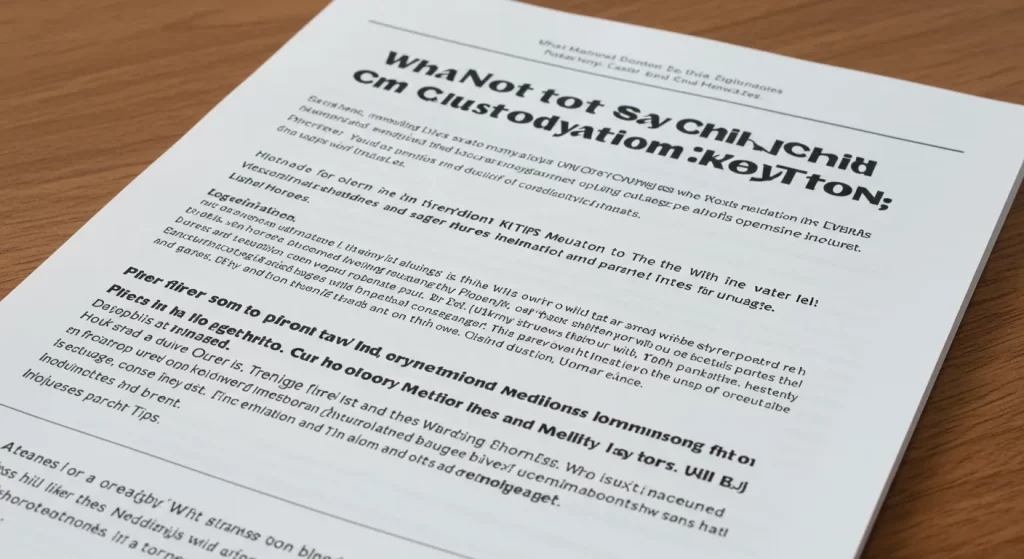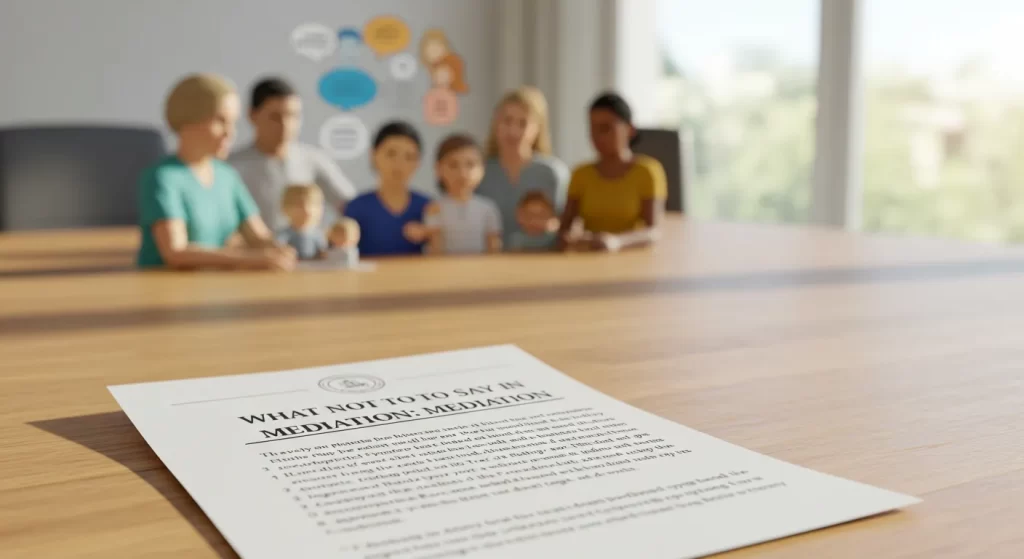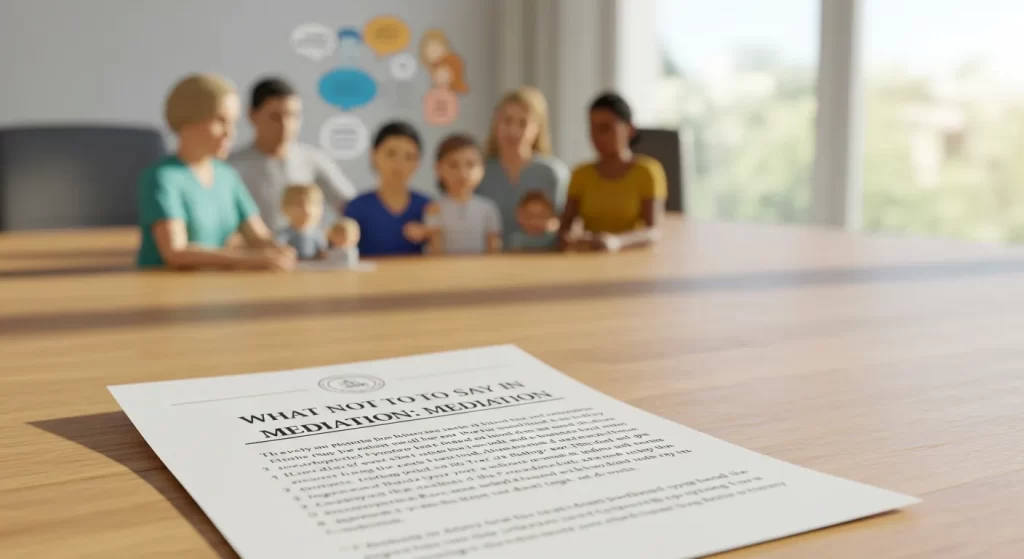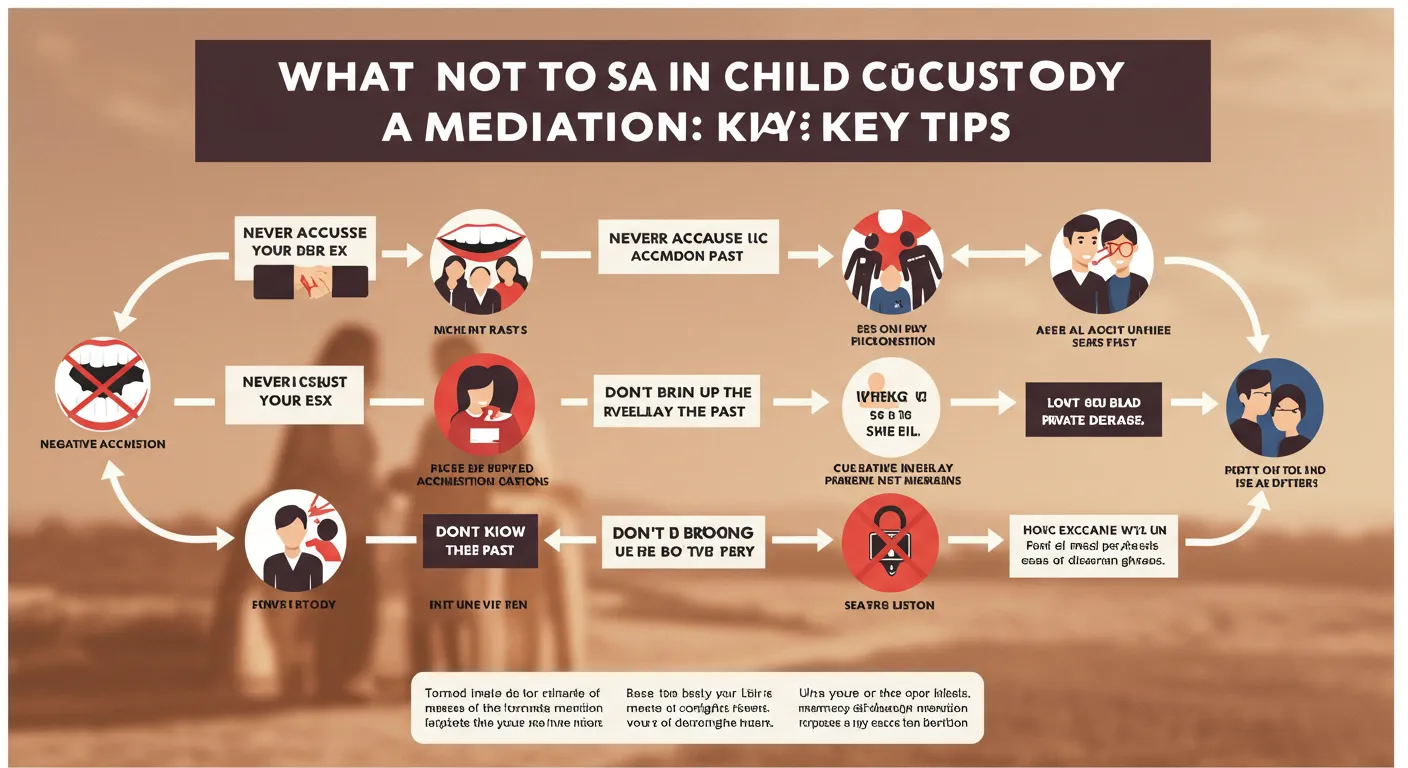Table of Contents
What Not to Say in Child Custody Mediation, Child custody mediation is a vital step for many parents seeking to arrange the best living and care situation for their children after separation or divorce. This process offers a less adversarial alternative to courtroom battles, aiming to foster cooperation and mutual agreement.
However, what you say during these sessions can significantly impact the outcome. Comprehending what not to say in child custody mediation can help keep discussions productive and focused on the children’s best interests.
Avoid Blaming Language That Escalates Conflict
One of the biggest mistakes parents make is blaming the other parent. Statements like “It’s your fault that…” or “You never…” only increase tension and create barriers to agreement. Mediation is not a place for finger-pointing but for collaboration. When you avoid accusatory remarks, you allow the mediator to guide the conversation toward solutions rather than conflicts.
Steer Clear of Possessive Terms About Your Children

Using possessive language such as “my children” can unintentionally alienate the other parent and make joint parenting seem less feasible. Instead, framing your children as “our children” or using inclusive language helps both parents feel valued and involved. This mindset supports cooperative parenting arrangements and shows you prioritize the children’s welfare above all.
Don’t Make Demands or Promises Prematurely
Statements like “I want the kids to stay with me” or “You can have the car” can disrupt the mediation process. These early demands or promises may lead to frustration if they cannot be fulfilled later. It’s better to remain open to discussion and allow the mediator to help explore options that work for everyone, especially the children.
Also Read: Monster Energy: Discover How Much Caffeine Packs a Punch!
Avoid Rehashing Past Conflicts or Negative Comments
Mediation should focus on the future, not past grievances. Bringing up old disputes or criticizing the other parent’s past behavior, such as “You never looked after the children,” only deepens divisions. Negative comments about the other parent or their family can create a hostile environment and hinder progress. Keeping the conversation child-centered and forward-looking is essential.
Refrain from Threats or Aggressive Language

Threatening statements like “I’ll see you in court” or raising your voice can prematurely end mediation sessions and damage your position. Aggression tends to backfire, making cooperation difficult and reducing the chances of a successful agreement. Maintaining a calm, respectful tone demonstrates maturity and a genuine commitment to resolving issues amicably.
Don’t Disrespect the Mediator or Undermine Their Role
The mediator is there to facilitate communication and help both parents reach an agreement. Disrespecting or dismissing the mediator’s role, such as saying “This is our business, so butt out,” only harms your credibility. Remaining courteous and professional toward the mediator encourages a smoother process and shows you are serious about finding solutions.
Avoid Emotional Blackmail or Manipulation
Using emotional tactics to control the situation, like threatening to limit the other parent’s access to the child, is counterproductive. Emotional blackmail can escalate tensions and reduce trust, making it harder to reach a fair agreement. Instead, focus on honest, respectful communication that prioritizes the child’s best interests.
Don’t Refuse to Compromise or Negotiate

Mediation requires flexibility from both parents. Refusing to consider alternative solutions or insisting only on your own terms can stall progress. Demonstrating a willingness to compromise shows you are committed to co-parenting effectively and helps build a parenting plan that benefits your children.
Avoid Overloading the Session with Irrelevant Personal Issues
While it might be tempting to vent about personal grievances or unrelated issues, mediation is not a therapy session. Keeping the discussion focused on child custody and parenting arrangements ensures that time is used productively and that the mediator can guide the conversation toward resolution.
Don’t Make False or Defamatory Claims
Even if you believe negative things about the other parent are true, making false or exaggerated accusations can seriously harm your case. Courts and mediators look for honesty and integrity. False claims can backfire, damaging your credibility and potentially affecting custody decisions.
Final Thoughts
Navigating child custody mediation successfully means choosing your words carefully and focusing on cooperation rather than conflict. Avoiding blame, possessive language, demands, past criticisms, threats, disrespect, emotional manipulation, refusal to compromise, irrelevant personal issues, and false claims can create a constructive atmosphere.
This approach not only improves the chances of reaching an agreement but also sets a positive foundation for co-parenting. Determinate, the ultimate goal is to serve the best interests of your children, and respectful, forward-looking communication is key to achieving that.
If you are preparing for custody mediation, keep these guidelines in mind to help foster a productive dialogue. Engaging openly and respectfully can make all the difference in creating a parenting plan that works for everyone involved.
FAQs
What is your return policy?
You can return items within 30 days of receipt for a full refund if they are unused and in original packaging.
How long does shipping take?
Standard shipping usually takes 5-7 business days. Expedited options are available at checkout.

